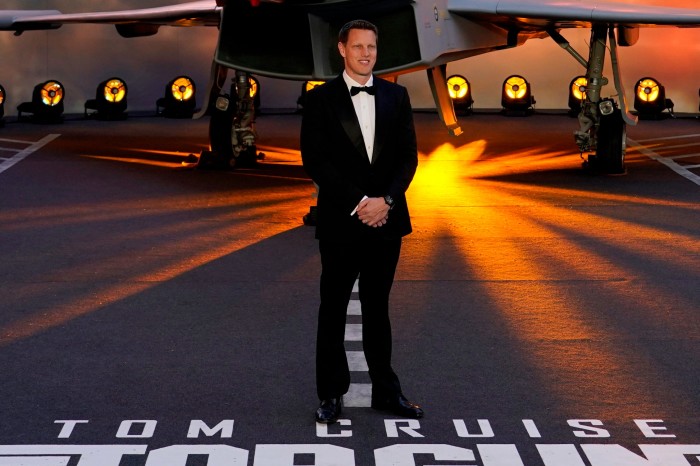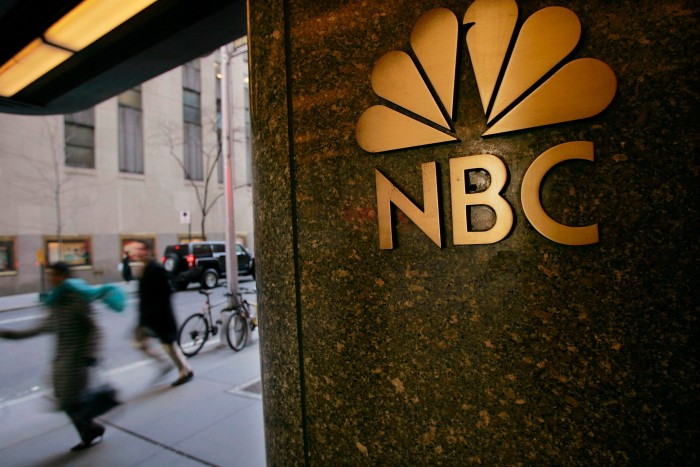Over its 98-year history, the Paramount Pictures studio lot has survived the arrival of talking pictures, bankruptcy, the Depression, the rise of TV and a range of different owners.
The question now is whether the 65-acre property on Melrose Avenue — the last major studio left in Los Angeles’ Hollywood district — can survive the streaming era.
The Redstone family, which has controlled Paramount since 1994, is considering a sale of the company behind Sunset Boulevard, The Godfather, Chinatown and Titanic. The fate of the studio could rest on which of the two bidders — one backed by the movie-loving son of a tech billionaire, the other by a leading private equity firm — comes out on top.
Wall Street analysts have begun calculating how much the lot could fetch if sold. “Maybe the studio lot is worth $1.5bn-plus, given the scarce resource of studio assets or just because the land has value in the heart of LA,” analysts at LightShed Partners wrote in December.
There are fears in Hollywood that Apollo, the private equity group bidding $26bn for Paramount’s assets alongside Sony, could sell the Melrose property if its offer is accepted. Apollo says it is seeking to buy “the whole company”.
David Ellison’s entertainment company, Skydance, with backing from private equity groups RedBird Capital and KKR, is the rival bidder for Paramount. Ellison, the son of Oracle co-founder Larry Ellison, is said to hold great affection for the lot and wants to keep it.
The future of the studio property is a relatively minor detail in the larger negotiations over Paramount. But its sale would have an outsized symbolic impact in Hollywood, which has been shaken in recent years by the rise of streaming services, a pandemic that shuttered cinemas worldwide, two lengthy labour strikes and thousands of job losses.
The share prices of Paramount and another century-old studio, Warner Bros, have both more than halved over the past five years. Another indicator of the troubled state of Paramount — and the broader concerns about the other legacy Hollywood studios — is the size of the Apollo-Sony bid. It values Paramount’s equity at around $12bn, roughly what the late media magnate Sumner Redstone paid for it in 1994. That sum would be more than $21bn today after adjusting for inflation.
Many bankers and industry executives say the “big five” Hollywood studios — Paramount, Warner, Disney, Universal and Sony — could shrink to three in the next few years. “Are we in the middle of a scaling back in Hollywood?” asks one LA-based dealmaker. “Absolutely.”
Tom Nunan, executive producer of the Oscar-winning film Crash and a lecturer at the UCLA School of Theater, Film and Television, says there is a “pall” over Hollywood. “There’s a re-examination of what business we’re in. What everyone can agree on is that the business seems to be broken.”
The source of this malaise is Netflix and the streaming revolution it unleashed, which lured customers away from the cable TV channels that were studios’ cash cows for decades. They responded by spending billions of dollars building their own streaming services, but these have yet to compensate for the decline in cable — a situation bankers have likened to a “melting ice cube”.
The two bidders have different strategies for fixing Paramount but Hollywood appears to be rooting for Ellison, a movie fanatic who has produced blockbusters in partnership with Paramount including Top Gun: Maverick. He has also been endorsed by figures such as Titanic director and producer James Cameron, who tells the Financial Times: “I love the Ellison idea.”
The making of a Hollywood hit machine
Some investors say they prefer the Apollo offer, which they argue is less complex and better for common shareholders. “I think the combination of Sony and Apollo is perfect,” says John Rogers, chair and co-chief executive of Ariel Investments. “Apollo has so much money and expertise in putting together deals and closing transactions.”
This tension boils down to what a veteran of Paramount describes as “Wall Street money guys versus Hollywood, where they’re fiercely protective of the creative process”.
The choice between the two bidders will ultimately be made by a four-person board committee and Shari Redstone, the daughter of Sumner, who died in 2020 at the age of 97.
She controls a majority of the voting shares in Paramount and is believed to oppose any transaction that would break up the company her father built. Redstone may be considering a third option: not to sell to either group.
Paramount’s predicament has been a decade in the making.
After the entertainment industry consolidated through a series of megamergers — Comcast and Universal in 2011, Disney and Fox in 2019, Warner and Discovery in 2022 — Paramount emerged a smaller player in this new landscape.
Viewed as too small to compete on its own, the company has been the subject of feverish takeover speculation among bankers and Hollywood dealmakers for years.

Redstone has long resisted such talk. She had spent years fighting off rival executives and her elderly father’s girlfriends to finally take hold of her family’s media empire in 2019. Selling was not part of the plan. “It was her family’s legacy, so she wanted to make a run at it,” says a former Paramount executive.
Even during 2022’s “Great Correction” in Netflix shares, which dragged down the valuations of Paramount and its peers, the company pushed forward with an ambitious leap into the streaming wars.
This all began to change a year ago, when Redstone started to feel the pinch on a personal level. Last May, Bob Bakish, then chief executive of Paramount, slashed its quarterly dividend from 25 cents a share to 5 cents a share. The move rattled investors and sent the stock tumbling.
It also had an impact on Redstone’s own finances. National Amusements (NAI), the Redstone holding company and cinema chain founded by her grandfather in 1936, emerged from the pandemic heavily in debt. NAI relied on the cash from Paramount’s dividends to help pay the loans. “The dividend cut had an impact on the family business,” says one person familiar with the matter.
Redstone was also profoundly affected by the October 7 Hamas attack on Israel, and has been spending more of her time on efforts to combat antisemitism, says a person close to her. Another person, involved in one of the bids, says she has “been in this for a long time . . . I think she’s ready to move on.”
She sought out the help of Byron Trott, a former Goldman Sachs banker known as a discreet adviser to some of America’s wealthiest individuals, including Warren Buffett and Michael Dell.
His BDT & MSD merchant bank was brought in to manage NAI’s debt — as well as a potential sale process at Paramount Global. He arranged a loan to NAI of about $125mn last year to help repay part of $500mn in borrowings from Wells Fargo.
Trott advised Redstone that she had two choices: find a way to restructure internally, or sell part or all of Paramount. “For Shari, there was a certain emotional component to this,” says a seasoned media executive. “She was estranged from her dad for a long time, but they reconciled towards the end of his life. She became the steward of his legacy.”
“When she finally achieved that, selling was not something she was comfortable doing because it was her family’s legacy,” the person adds.
Then last summer Redstone was approached by Ellison, who is almost three decades her junior. It was the beginning of a conversation that has carried on for nearly a year, kick-starting a chaotic bidding war over some of Hollywood’s most storied assets.

Like Redstone, Ellison had spent much of his life in the shadow of a hard-charging billionaire father. With funding from Larry, Ellison founded his own Hollywood studio in 2010 when he was 27, naming it Skydance after his love of stunt flying. His sister, Megan, also pushed into Hollywood with her own studio, Annapurna Pictures, which has made films such as American Hustle.
David Ellison has built a strong reputation among Hollywood’s creative class and has co-produced a series of films with Paramount, including recent iterations of Mission: Impossible and Terminator.
Ellison’s interest was “innovative and different” from other approaches she had received, says a person close to Redstone, adding that she saw in him another owner-operator who could provide safe hands for Paramount.
But Redstone’s discussions with Ellison drove a wedge between herself and Bakish, previously a loyal ally. He began searching for alternative deals in a bid to save his job, enlisting the informal help of LionTree banker Aryeh Bourkoff, according to people familiar with the matter.
Bakish’s efforts were successful in flushing out another bidder: Apollo, first on its own, then with Sony Pictures. But his manoeuvring also agitated the rest of the board, and in late April he was pushed out.
He has been replaced by a trio of longtime company executives — a scenario that has left the group in a state of limbo as its thousands of staff wait to find out if a deal will be made, and if so with whom.
Some saw Bakish’s exit as a sign of dysfunction at Paramount. “It’s just extraordinarily odd and unprecedented to let go of the CEO in the middle of a transaction,” says Rogers, of Ariel. “It was just totally illogical.”
Both of the bids for Paramount face significant hurdles.
Skydance, which has made its final pitch to a Paramount board committee evaluating the proposals, has financially savvy backers that include Larry Ellison and RedBird founder and former Goldman Sachs banker Gerry Cardinale.
Ellison plans to revive Paramount by restructuring the film and television businesses while making its own streaming service, Paramount+, more competitive by improving its technology.
But his challenge is persuading Paramount’s outside investors to accept the structure of its proposal. Skydance’s two-step offer envisages first acquiring NAI, which holds 77 per cent of Paramount’s voting A-shares. That would give Redstone an immediate $2bn cash payday and Skydance voting control of Paramount, albeit with only about a tenth of the economic rights.
People briefed on the proposed transaction say Skydance and Paramount would then merge in an all-stock deal that, based on Skydance’s $5bn private valuation, implies a premium of about 30 per cent for Paramount’s other shareholders. In total, they say Ellison’s group would be investing about $10bn into Paramount, including a $3bn capital injection into the business.
But independent Paramount shareholders, most of whom own the non-voting B-shares, have rebelled. They say the deal disproportionately favours Redstone over other investors. In an effort to win them over, the Ellison consortium sweetened its bid recently, throwing in an extra $1bn of cash to Paramount’s minority shareholders.

By contrast, the Apollo-Sony approach gives all Paramount’s shareholders, including Redstone, the same cash premium for their shares. The two companies plan to restructure Paramount by cutting costs, creating new synergies with Sony and potentially spinning off assets. Sony, which chose to sell its shows to streamers instead of compete with them, is unlikely to want to keep the Paramount+ service.
Their proposal comes with more regulatory risk, however. Given its Japanese ownership, Sony Pictures could be barred from owning Paramount’s CBS news network while Apollo, which already owns TV broadcasters, could run into ownership caps.
Apollo and Sony say they can structure the deal in a way that avoids upsetting the authorities. “From a regulatory perspective, we feel very comfortable with a deal getting through,” says a person involved in the joint bid.
But Washington has been tough on media deals in recent years, having in 2022 blocked Paramount’s proposed $2.2bn sale of book publisher Simon & Schuster to rival Penguin Random House. To his frustration, Bakish ended up selling S&S to private equity group KKR a year later for $600mn less.
The Biden administration’s regulatory stance has worried some bankers and Hollywood executives who believe that consolidation is the only way to bring the industry back to life.
One possible combination that is frequently discussed is a merger between NBCUniversal, owned by cable giant Comcast, and Warner Bros Discovery. “The best thing for the business is an NBC-Warner tie-up,” says one banker, expressing a common sentiment in Hollywood.
The alternative, some say, is that tech companies will ultimately end up controlling the movie and TV business. “There’s no question there needs to be consolidation in Hollywood,” says a person involved in the Paramount talks.
The question now, both on Wall Street and in Hollywood, is whether Redstone is ready to make a deal. Some warn that she needs to act sooner rather than later.
“If there isn’t a deal, what happens? I don’t think that the prognosis is good,” says the seasoned media veteran.
“Some of these [potential acquirers] may just sit around and wait for it to run into more difficulty . . . and revisit it in six months or a year.”














